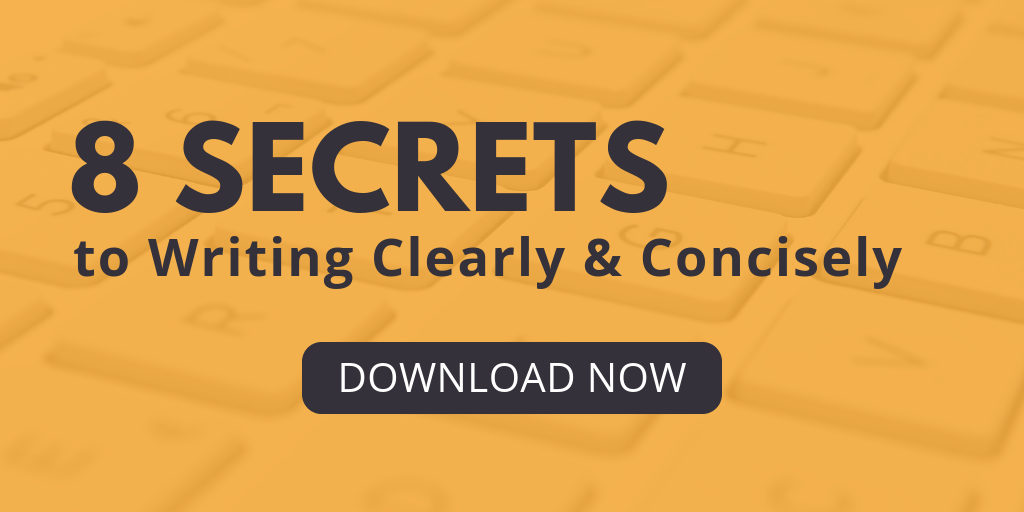No matter how many times you’ve done it, writing a proposal is always a little nerve-wracking. Whether you're applying for grant funding or pursuing professional services contracts, pressure to distinguish your organization from the competition and show your expertise is high.
While you can’t make other applicants disappear, you can write a proposal that stands out from the pack—without relying on fancy formatting and impressive graphics or putting in hours of overtime.
1. Keep It Simple
How often have you had to read something so dense and dry, you couldn’t retain any of the content? So full of jargon that you’d need a professional codebreaker to make sense of it?
For proposal writing, simple is best. Direct language keeps your reader engaged—no mean feat when you consider a reviewer may have to read dozens of similar proposals. Cutting unnecessary words, avoiding jargon, and using plain language makes your writing more accessible, both logically and linguistically. It makes your ideas easier to understand and remember. More importantly, it makes it easier for reviewers to see your value proposition and to share it with others. It also promotes clarity and transparency, which increases the reader’s trust. For agencies that might not be familiar with your organization, establishing your integrity is key.
2. Keep It Brief
Whether you’re bound by a page limit or a reviewer’s attention span, responding to an RFP is an exercise in maximizing the impact of your writing. The best proposals strategically use limited space, providing as much valuable information in as few words possible. They also make the information easy to digest by breaking it up into smaller pieces. Whether you use short paragraphs, bullet points, or an outline structure, the important part is that your proposal is easy to read. Long blocks of text are great if you’re writing Russian literature; not so much if you want to keep a reviewer’s eyes from glazing over.
One important caveat: brief doesn’t mean devoid of detail. Often, RFPs ask for specific information about everything from an applicant’s past performance to the proposed project plan covering the RFP’s scope of work. You can and should respond to these prompts; just try to be as concise as possible.
3. Take Breaks
There’s nothing more frustrating than pouring your blood, sweat, and tears into a proposal only to catch a spelling mistake, grammatical error, misplaced punctuation mark, or formatting error after you’ve submitted it. Depending on your reviewer, this can be a death sentence: if your proposal is full of careless errors, how can they trust your work won’t be too?
One of the easiest ways to avoid this pitfall is to walk away. If you can, take an hour, an afternoon, or a day off from writing and come back to it later with fresh eyes. Getting some distance and giving yourself time to recharge makes it easier to spot mistakes when you come back.
4. Use the RFP as an Outline and a Checklist
Every RFP is different. Every proposal should be too.
Taking a one-size-fits-all approach to proposal writing is a quick way to disqualify yourself from consideration. It tells the reviewer that you didn’t take the time to understand what they were asking for, and that you aren’t invested in solving their problem. This is where the RFP itself can be helpful.
Identifying key questions and priorities gives you a ready-made checklist you can use when writing, reviewing, and editing your proposal. Structuring your proposal so it follows the flow of the RFP likewise provides an easy way for reviewers to evaluate whether you’ve met the requested criteria. It also allows you to identify any details that might be missing from the RFP or questions you may have. Bonus: contacting the agency for clarification shows an eye for detail and a commitment to quality. It also helps keep your organization top of mind when it comes time to review proposal submissions.
5. Save Key Text for Future Proposals
As the saying goes, “don’t reinvent the wheel.” While proposals should be tailored to individual programs, grants, and grant-making organizations, there’s nothing wrong with reusing text if it’s universally applicable (for example, a company bio or examples of past work) or compelling and well-written. In addition to saving time, it establishes a consistent tone for your proposals. This helps agencies get familiar with your organization and shows reliability—particularly important if you’re responding to multiple RFPs.
6. Get an Outside Perspective
Familiarity breeds contempt—or, as discussed earlier, an inability to spot mistakes and recognize gaps. One of the most useful things you can do during the editing process is to hand your work to someone who isn’t involved with the proposal (though it’s best to ask someone who understands the proposal process). Having a second set of eyes not only helps prevent careless mistakes, it’s also an opportunity to receive feedback from someone looking at your proposal for the first time—just like your reviewer will be.
Ideally, a reader should be able to walk away from your proposal with a clear understanding of what the RFP is asking for (without having to consult it), how your organization can meet those needs, and why you’re the best candidate for the job. Having a proofreader who can tell you where something might be confusing, vague, or missing gives you the chance to fill those gaps and ensure your proposal is strong.
Write Winning Proposals
Writing a proposal in response to an RFP is a time-consuming task, so when you do it, you must write to win—not just compete. Let WordRake help you make your proposal clear, crisp, and concise. Our software will cut jargon and useless words and show foundations and government agencies you can use plain language to effectively tell your story. When you use WordRake, you’ll receive instant feedback that will lead to better results. Get a 7-day free trial now.








